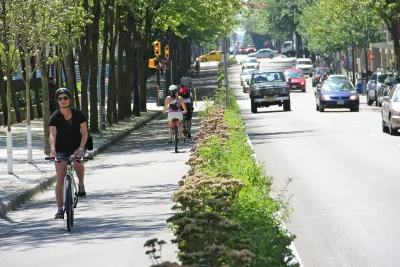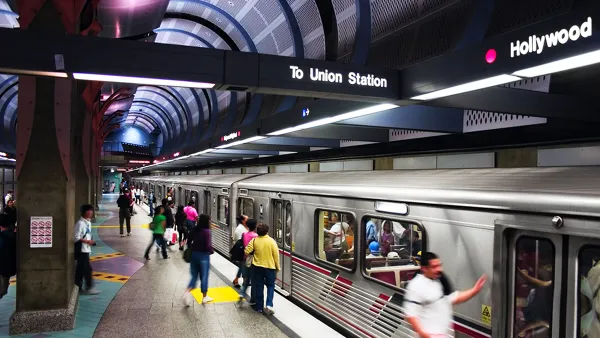Local and state agencies can apply for federal Complete Streets funding without matching funds until 2026.

In an effort to prioritize safer streets and more accessible transportation options, the Federal Transit Administration (FTA) announced it will waive a local funding match requirement for Complete Streets planning projects through 2026, reports Dan Zukowski in Smart Cities Dive. The waiver applies to projects funded by the Metropolitan Planning Program and the State Planning and Research Program.
“The waiver will support the full consideration of public transportation in the development and implementation of Complete Streets policies that require or encourage a safe, comfortable, integrated transportation network for all users, regardless of age, ability, income, ethnicity, or mode of transportation,” FTA Administrator Nuria Fernandez said in a letter shared on the FTA website.
Eligible activities include the development of Complete Streets standards, mobility and accessibility projects, connectivity plans, and policies to support transit-oriented development (TOD). This ties back to a rule written into the Bipartisan Infrastructure Law that requires states and metropolitan planning organizations to allocate 2.5 percent or more of planning funds to Complete Streets projects. In early 2022, the Federal Highway Administration (FHWA) launched an effort to make the design of federally funded roadways more aligned with the Complete Streets approach.
FULL STORY: Complete Streets local funding match requirement waived through 2026, FTA says

National Parks Layoffs Will Cause Communities to Lose Billions
Thousands of essential park workers were laid off this week, just before the busy spring break season.

Retro-silient?: America’s First “Eco-burb,” The Woodlands Turns 50
A master-planned community north of Houston offers lessons on green infrastructure and resilient design, but falls short of its founder’s lofty affordability and walkability goals.

Delivering for America Plan Will Downgrade Mail Service in at Least 49.5 Percent of Zip Codes
Republican and Democrat lawmakers criticize the plan for its disproportionate negative impact on rural communities.

Test News Post 1
This is a summary

Test News Headline 46
Test for the image on the front page.

Balancing Bombs and Butterflies: How the National Guard Protects a Rare Species
The National Guard at Fort Indiantown Gap uses GIS technology and land management strategies to balance military training with conservation efforts, ensuring the survival of the rare eastern regal fritillary butterfly.
Urban Design for Planners 1: Software Tools
This six-course series explores essential urban design concepts using open source software and equips planners with the tools they need to participate fully in the urban design process.
Planning for Universal Design
Learn the tools for implementing Universal Design in planning regulations.
EMC Planning Group, Inc.
Planetizen
Planetizen
Mpact (formerly Rail~Volution)
Great Falls Development Authority, Inc.
HUDs Office of Policy Development and Research
NYU Wagner Graduate School of Public Service





























